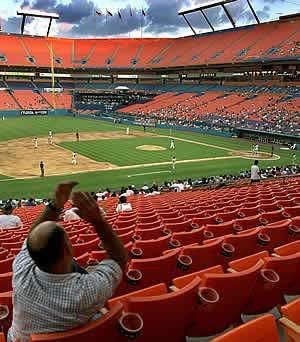NY Daily News article on auction houses
Conflict of interest for authenticators?
With all the money being spent on memorabilia, how much longer can people stick their heads in the sand and pretend there is no conflict of interest?
With all the money being spent on memorabilia, how much longer can people stick their heads in the sand and pretend there is no conflict of interest?

GO MARLINS! Home of the best fans in baseball!!
0
Comments
Always looking for 1957 Topps BB in PSA 9!
Suprisingly even stuff that comes straight from the deceased players familial estate is prone to be inaccurately described by the auction house...how else do you explain the $71,000 CY Young Glove purchase in the article, where the buyer contacted the family and found it was used by Cy's grandchildren, not himself...big difference.
A quote from an article participant sums it up best here, in terms of a solution:
According to Terman, the handful of authenticators who control the memorabilia business through their ties to dealers and auction houses, pose a conflict of interest to buyers. "Until we have an independent board of authenticators, with no ties to dealers or auction houses, we'll always have this problem," he says.
Website: http://www.qualitycards.com
Weren't criminal charges brought against Christies and Sotheby's a few years ago for price fixing, or something of the sort? I believe there was also some talk at the time about the house extending credit to certain buyers to help them afford to bid items up as well. I thought there was some sort of settlement on this, but I could have the details off a bit. Seems like they got caught, or at least charged, for a few things.
Always looking for Topps Salesman Samples, pre '51 unopened packs, E90-2, E91a, N690 Kalamazoo Bats, and T204 Square Frame Ramly's
Always looking for 1957 Topps BB in PSA 9!
Website: http://www.qualitycards.com
Interesting story....the only thing is that sports memorbilia is a pimple on Christies a$$ so to speak...
This is just typical of the publicity our hobby gets. How often do you see a single positive thing said about the industry??
That's not to say that companies, such as PSA that do 3rd party authenticity, are fraudulent. For the most part, Mr. Spence et al with other companies do a good job. And Jim will tell you that he has made errors in the past. It's inevitable. But that process may lead to a conflict of interest and that is what bothers me, and a lot of other collectors.
I've also watched Jimmy Spence do the same, give the thumbs up or down on a signature in a blink of an eye.
Now a card is card is a card. Four corners, four edges, a front and a back. I got to think that a signature is more difficult to judge. A number of factors must be considered due to a lifetime of change in a signature. How do they make such a snap decision on a sig? I would like to know. When PSA/DNA sets up at the National, do they for example have access to known sigs of lets say Gil Hodges? I personally witnessed PSA give the thumbs up on a Hodges sig on a photo in two seconds (call me a liar, maybe Jim looked at it for 10 seconds) flat at a show in Chicago. How do they really know? They spent more time typing up the LOA then looking at what they were authenticating.
<< <i>Article is right on the money. THEY authenticate it and we're supposed to believe it. Billy Crystal's 1960 Mantle glove wasn't even manufactured until at least 1964!! I do not buy any memorabilia. Too risky. >>
not risky if you do the legwork.
<< <i>That story really makes you think. I am bidding on a bat in the Mastro auction, and I have always wondered about "authenticity". >>
contact H&B or the manufacturer
and they will help.
I'm sure that's how a lot of stuff gets authenticated and the naive buyers go paying. "But I have a letter of authenticity, so it is real and worth a lot" is what they say, when a letter of authenticity is basically worthless, just like most of the forgery autographs out there.
From what I know, authenication services don't say whether or not a piece is forged...they leave that door open. What they do say is whether or not they're sure a signature is legit. That means that a lot of shaky sigs get thown out with the bath water. And, better to err on the side of caution, methinks, in a situation as dicey as whether or not a signature is valid.